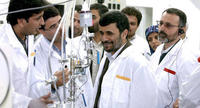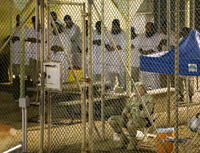-
Experts: Iran's threat to kill U.S. generals is serious

Iran’s anger at the massive blow the Stuxnet malware has inflicted on its nuclear weapons program boils over; the commander of Iran’s Revolutionary Guard, Gen. Mohammad Reza Naghdi, threatened that American generals will be targeted and killed in revenge for last week’s attacks on two of Iran’s leading nuclear scientists; Iran and Middle East experts say that Iran often makes outlandish threats, but that this one has to be taken as a serious and credible threat because it came directly from Naghdi; the most likely place for an attack to occur would be Iraq, and any attack would most likely be carried out by surrogates working for the Iranian Revolutionary Guard; Bahrain, Qatar, and other Gulf states would also allow the Iranian general to carry out the threat
-
-
Stuxnet virus set back Iran's nuclear weapons program by two years: Langner
Ralph Langner, top German computer security expert and the leading authority on Stuxnet, says Stuxnet was as effective in disrupting Iran’s nuclear weapons program as a direct military strike — but without any fatalities; the malware has set back the Iranian program by two years; expert says the Israeli military was the likely creator of the virus
-
-
ASIS International, BSI release Business Continuity Management ANSI standard
ASIS International, BSI have released Joint Business Continuity Management ANSI Standard; the standard provides auditable criteria with accompanying guidance for developing and implementing a business continuity management system that improves an organization’s ability to prepare for, respond to, and recover from a disruptive event
-
-
U.K. prepares for pro-WikiLeaks attacks on government Web sites

Britain’s national security adviser has warned that government Web sites are at risk of cyber attack from pro-WikiLeaks hackers; the office of Prime Minister David Cameron said security adviser Peter Ricketts has raised his concerns before an extradition hearing scheduled for today (Tuesday), when WikiLeaks founder Julian Assange is to appear at a London court; Cameron’s spokesman Steve Field said the government’s priority is Web sites dealing with information that belongs to members of the public; he said the government has particular concerns about Web sites used to file tax returns or to claim benefits, which store sensitive personal information
-
-
WikiLeaks's Assange to be indicted for spying "soon"

If charges against Assange are brought, it would reflect a watershed event in the United States, which has never successfully prosecuted a news organization for publishing classified information; a report released last week by the Congressional Research Service acknowledged that federal prosecutors would have a hard time making charges stick against the whistle-blower Web site, which operates almost entirely abroad; “There may be First Amendment implications that would make such a prosecution difficult, not to mention political ramifications based on concerns about government censorship,” the report states, adding that additional difficulties would arise from the fact “that the investigation implicates —- foreign nationals whose conduct occurred entirely overseas”
-
-
Lawmakers urge Obama to expand State Department's cybercrime reach
Lawmakers call President Obama to expand the U.S. State Department’s foreign policy mechanisms to address crime and security on the Internet; Senator Kirsten Gillibrand (D-New York) joined with Senator Orrin Hatch (R-Utah) to author the International Cybercrime Reporting and Cooperation Act; this bill will hold foreign countries accountable for cybercrime committed on their soil
-
-
Senate bill would require minimum cybersecurity standards for Internet
Senator Benjamin Cardin (D-Maryland) has introduced a bill that would require the U.S. government to work with the private sector to propose minimum standards for internet and cybersecurity safety; “Just as automobiles cannot be sold or operated on public highways without meeting certain minimum safety standards, we also need minimum Internet and cybersecurity safety standards for our information superhighway,” Cardin said
-
-
Aussie intelligence chiefs fear nuclear war between Israel and Iran
WikiLeaks documents show that Australian intelligence agencies fear that Israel might launch military strikes against Iran and that Tehran’s pursuit of nuclear capabilities could draw the United States and Australia into a potential nuclear war in the Middle East; Australia’s top intelligence agency also says that Iran’s nuclear program is intended to deter attack and that it is a mistake to regard Iran as a “‘rogue state”
-
-
Experts: Stuxnet worm wreaks havoc at Iran's nuclear sites

Iran’s nuclear program is still in chaos as a result of the Stuxnet attack; the American and European experts say their security Web sites, which deal with the computer worm known as Stuxnet, continue to be swamped with traffic from Tehran and other places in the Islamic Republic, an indication that the worm continues to infect the computers at Iran’s two nuclear sites; Stuxnet was designed to take over the control systems and evade detection, and it apparently was very successful; last week President Mahmoud Ahmadinejad, after months of denials, admitted that the worm had penetrated Iran’s nuclear sites, but he said it was detected and controlled; the second part of that claim, experts say, does not ring true
-
-
Wikileaks: North Korea "helps Burma with nuclear sites"
U.S. diplomatic cables released by WikiLeaks reveal that Burma may be building missile and nuclear sites in remote locations with support from North Korea; the documents cite witnesses who say North Korean workers are helping Burma construct an underground bunker in a remote jungle; one cable reads: ‘The North Koreans, aided by Burmese workers, are constructing a concrete-reinforced underground facility that is ‘500 ft from the top of the cave to the top of the hill above’”
-
-
King: House Homeland Security panel will be vigorous, demanding
Long Island congressman Peter King will take over as the new chair of the House Homeland Security Committee — New York state’s lone chairman in the new Congress (and even this only until 2012, when he will be term-limited out of the chairman’s chair, unless he gets a waiver from the Republican leadership); he has been a vocal critic of the Obama administration on a number of issues over the last two years, and says he plans for a much more vigorous — and possibly controversial — committee when he re-takes the gavel; King expressed concern about Obama administration officials’ response to what he calls the “incalculable damage” caused by the massive document leak released by WikiLeaks; “Considering how fast they moved [to file a laswsuit] on Arizona’s immigration law and how determined they were to move against our CIA agents—- there is definitely something missing here,” he asserted
-
-
Gitmo repeat offender rate rises sharply

The number of Guantanamo Bay detainees returning to the battlefield continues to grow at an extraordinary rate; new report from the director of U.S. national intelligence says that 150 of the 598 detainees who have been transferred out of Guantanamo’s detention camps, about 25 percent, are now confirmed or suspected of returning to the battlefield; of that group, 13 are dead and 54 are again in custody, while 83 remain at large; CIA director Leon Panetta said the biggest concern is ex-detainees who not only return to the battlefield but take up leadership positions within al Qaeda, a reference to the terror group’s branch in Yemen, where at least two leaders are Saudis and former Guantanamo detainees
-
-
Medical isotopes no longer require weapons-grade uranium
Highly enriched uranium (HEU) is used in nuclear weapons, but it is also used to make the radioisotopes that are injected in tiny quantities into people to diagnose and treat disease; indeed, making medical isotopes is a time-honored excuse for enriching uranium, if you want to build nuclear weapons but do not want to admit you are doing so (this is the cover Iran is using for its bomb-oriented enrichment program); South Africa’s Pelindaba reactor is now producing medical treatment-oriented molybdenum-99 (Mo-99) made from low-enriched uranium
-
-
Judge throws out suit aiming the bar U.S. from killing al-Awlaki

Anwar al Awlaki, the New Mexico-born fire-brand Islamic cleric, from his hideout in Yemen, has been urging Muslims to kill Americans; the Obama administration has placed him on its capture-or-kill hit list, and U.S. special forces and intelligence operatives have been searching for him; the cleric’s father, Nasser al Awlaki of Yemen, sued the U.S. government, arguing that international law and the Constitution prevented the administration from unilaterally targeting his son for death unless he presents a specific imminent threat to life or physical safety and there are no other means to stop him; the suit also tried to force the government to disclose standards for determining whether U.S. citizens like his son can be targeted for death; a federal judge has thrown out the law suit, writing in his opinion: “The serious issues regarding the merits of the alleged authorization of the targeted killing of a U.S. citizen overseas must await another day or another nonjudicial forum”
-
-
Microsoft partner in China trains hackers, steals 50 MB of U.S. gov't e-mail
A Chinese security firm called Topsec got access to the Windows source under a 2003 agreement designed to help companies improve the security of the Microsoft operating system; the company, rather than help Microsoft make Windows more secure, worked closely with Chinese intelligence to exploit Windows weaknesses: they helped the Chinese government train hackers — and steal more than 50 MB of secret U.S. government e-mails; Topsec started out in 1995 with funding of just $4,400, and by 2002 had earnings about $440 million; it is now China’s largest provider of information security products and services
-
More headlines
The long view
Factories First: Winning the Drone War Before It Starts
Wars are won by factories before they are won on the battlefield,Martin C. Feldmann writes, noting that the United States lacks the manufacturing depth for the coming drone age. Rectifying this situation “will take far more than procurement tweaks,” Feldmann writes. “It demands a national-level, wartime-scale industrial mobilization.”
No Nation Is an Island: The Dangers of Modern U.S. Isolationism
The resurgence of isolationist sentiment in American politics is understandable but misguided. While the desire to refocus on domestic renewal is justified, retreating from the world will not bring the security, prosperity, or sovereignty that its proponents promise. On the contrary, it invites instability, diminishes U.S. influence, and erodes the democratic order the U.S. helped forge.
Fragmented by Design: USAID’s Dismantling and the Future of American Foreign Aid
The Trump administration launched an aggressive restructuring of U.S. foreign aid, effectively dismantling the United States Agency for International Development (USAID). The humanitarian and geopolitical fallout of the demise of USAID includes shuttered clinics, destroyed food aid, and China’s growing influence in the global south. This new era of American soft power will determine how, and whether, the U.S. continues to lead in global development.
Water Wars: A Historic Agreement Between Mexico and US Is Ramping Up Border Tension
As climate change drives rising temperatures and changes in rainfall, Mexico and the US are in the middle of a conflict over water, putting an additional strain on their relationship. Partly due to constant droughts, Mexico has struggled to maintain its water deliveries for much of the last 25 years, deliveries to which it is obligated by a 1944 water-sharing agreement between the two countries.
How Disastrous Was the Trump-Putin Meeting?
In Alaska, Trump got played by Putin. Therefore, Steven Pifer writes, the European leaders and Zelensky have to “diplomatically offer suggestions to walk Trump back from a position that he does not appear to understand would be bad for Ukraine, bad for Europe, and bad for American interests. And they have to do so without setting off an explosion that could disrupt U.S.-Ukrainian and U.S.-European relations—all to the delight of Putin and the Kremlin.”
How Male Grievance Fuels Radicalization and Extremist Violence
Social extremism is evolving in reach and form. While traditional racial supremacy ideologies remain, contemporary movements are now often fueled by something more personal and emotionally resonant: male grievance.
